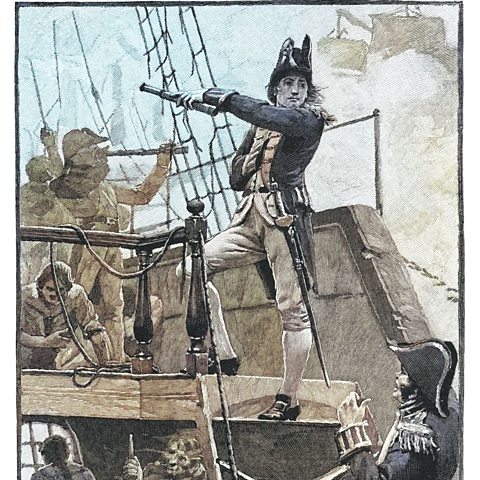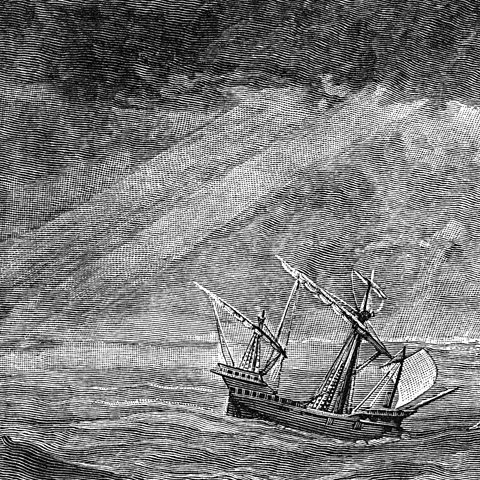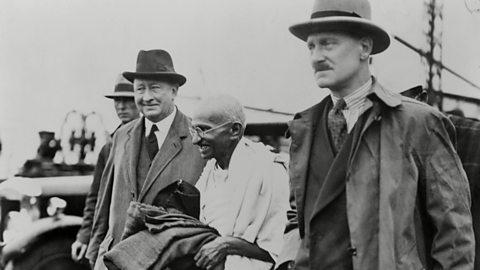The English language is full of sayings or idioms that, on the face of it, donât make a lot of sense.
If you heard something âfrom the horseâs mouthâ, why is it particularly reliable? Why are we âunder the weatherâ when weâre ill? And how could anyone âsteal someone elseâs thunderâ?
In many cases the answers have unusual, and often disputed, origins. Here are the stories behind five common sayings.

Spill the beans
There are a few explanations for why we might say someone âspilled the beansâ when they revealed something before it was meant to be known.
Some accounts have it originating in the United States in the early 20th Century, when it meant to upset or disturb a stable situation.
But the most commonly accepted is that it originated thousands of years ago in Ancient Greece, where votes were made by placing either a white or a black bean in a vase, depending on whether they meant yes or no. The beans were later counted to reveal the result.
But if the vase was accidentally (or deliberately) knocked over, the beans would be visible to everyone, and the result would be known before it was meant to be. Hence youâd âspilled the beansâ.


Straight from the horseâs mouth
When we say we heard something âstraight from the horseâs mouthâ we mean that we trust the information to be reliable because it came from someone who would know. So where did our equine friends get this admirable reputation for truth-telling? Well, there are a couple of explanations.
One is that it seems to have originated in racing circles as a kind of joke. A good betting tip was said to have come âstraight from the horseâs mouthâ, since the horse would know best what kind of chances it had in the race.
But another explanation is to do with horse teeth. When selling a horse, the owner might lie about its age. Since the only totally reliable way of determining a horseâs age is examining its incisors, the truth about the horseâs age is best checked by looking in its mouth. So the truth comes âstraight from the horseâs mouthâ.
To complicate matters, the phrase ânever look a gift horse in the mouthâ is also often said to have its origins in this dental method of ageing horses.


To turn a blind eye
The idea of turning a blind eye to something that you don't want to admit having seen goes back as far as 1698, when clergyman John Norris used the phrase in his book A Discourse of Walking by Faith.
But the phrase really gained popular currency about 100 years later, after the Battle of Copenhagen in 1801, when Admiral Nelson was ordered to disengage the Danish fleet by Admiral Sir Hyde Parker. Nelson didnât want to obey the order, so put a telescope to his blind eye and said that he could not see the signal.
Despite its earlier uses, this is the explanation that is most often given for the meaning of the phrase, as well as its current popularity.


To steal someone's thunder
When you âsteal someoneâs thunderâ, you pre-empt someoneâs elseâs achievement with one of your own, thus robbing them of the praise they might have got.
The phrase originates in a story from the 18th Century, when playwright John Dennis invented a new machine called a thunder sheet for creating storm sounds on stage for his play Appius and Virginia (1709).
Sadly, the cutting-edge special effects werenât enough to save the play, which was a flop. But later, Dennis heard that the same venue - Theatre Royal, Drury Lane - was using his machine for a production of Macbeth without his permission. According to the story, the furious writer declared: âThe villains will play my thunder but not my plays!â
They had âstolen his thunderâ.


To be under the weather
We often say someone is âfeeling a bit under the weatherâ when they have a mild illness or are just not feeling 100%. But why would we phrase it that way? The sayingâs origins go back to Britainâs seafaring past, although the precise explanation is very difficult to pin down exactly.
In the days of sailing ships, the weather bow or rail was the part of the ship that faced directly into bad weather. During a storm this was the worst place to be, since it was most buffeted by the wind. So the original saying was âunder the weather bowâ which meant in a poor situation or ill and it later became shortened to âunder the weatherâ.
Thereâs a competing explanation that claims that ill sailors would be sent below deck to recover - they were said to be sent 'under the weather rail' which is where the connection with illness may come from.
And yet another explanation is that the phrase originates from the fact that when a ship pulled into port because of a storm, it docked âunder stress of weatherâ. So being âunder the weatherâ was connected with being in some sort of trouble.
Itâs a complicated story that suggests that sometimes common sayings might not have just one source.
This article was published in December 2023

Five historical quotes that we probably misquote
History is a rich tapestry of inspiring and meaningful sayings... including some that were entirely made up!

Why do we keep misspelling these words?
Find out what spelling can reveal about the evolution of English.

Three surprising changes that transformed the English language
They say that change is the only constant in life - and that's certainly true for language too.
